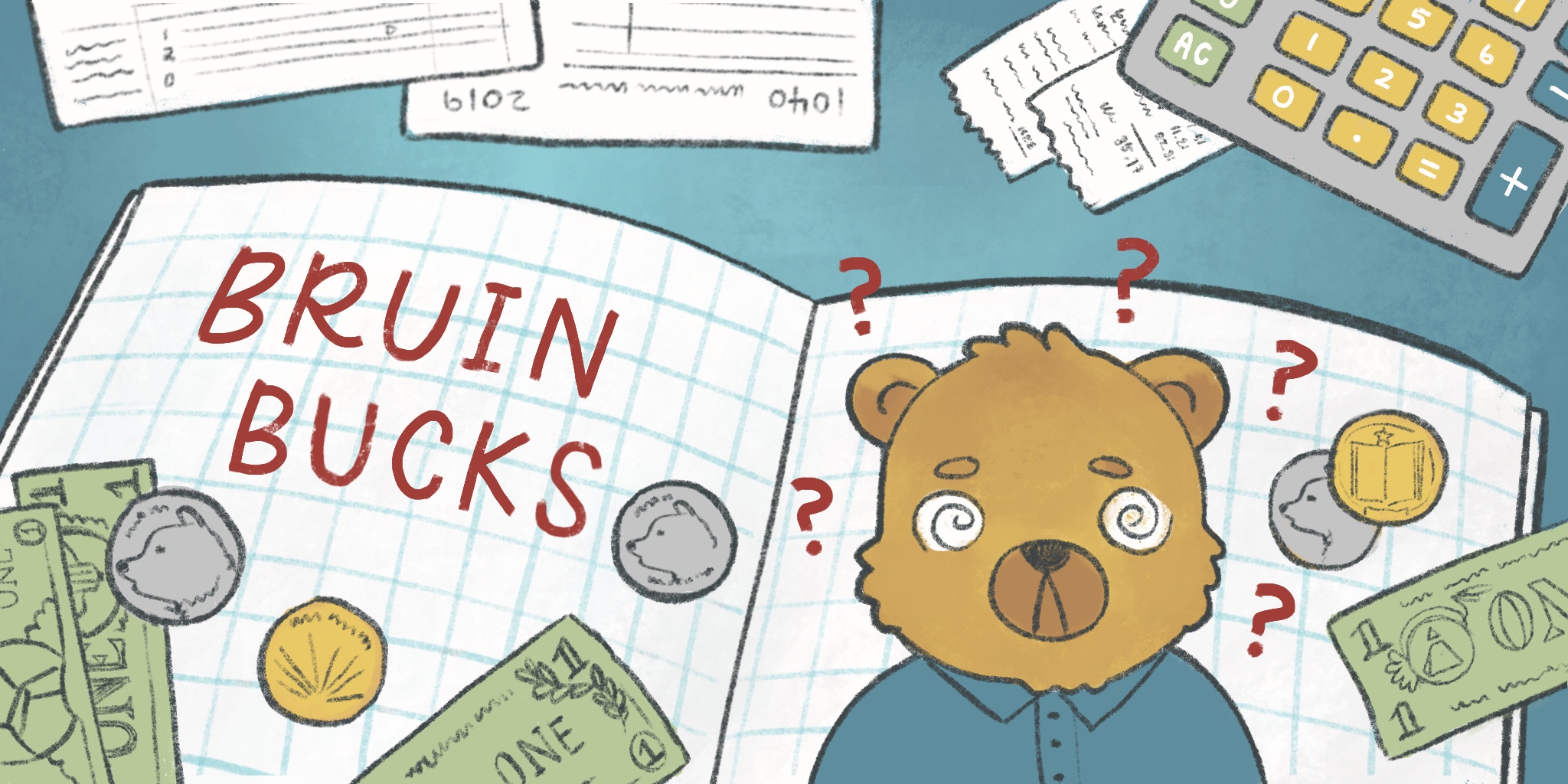Bruin Bucks: Here are some tips on saving money in a pandemic-induced recession

(Nghi Nguyen/Daily Bruin)

By Jenna Hajny
May 12, 2020 6:36 p.m.
It’s no secret that finances are often left to a student’s own devices: stocks, bonds, investing, assets – what do all these terms mean? Bruin Bucks tackles the confusing parts of personal finance they don’t teach you in school.
It’s no secret that the current pandemic is wreaking havoc on the U.S. economy – nearly 33 million Americans have lost their jobs since the virus hit about seven weeks ago.
This is not to mention, with a rising unemployment rate and no guarantee that a vaccine for COVID-19 will be developed anytime soon – if at all – financial experts suggest that the U.S. economy is on the brink of its worst downfall since the Great Depression.
While it may be frightening to contemplate finances in the wake of this crisis, the Quad is here to help you save money and maybe even make some extra dough – all from the comfort of your own home.
To begin, many financial experts cite careful budgeting as an effective way to monitor your finances.
According to Michelle Black, a leading credit expert and personal finance writer for Forbes Magazine, the first step of budgeting involves taking a detailed inventory of your essential expenses. In other words, you should try to identify how much you spend on necessities like housing, utilities, transportation and food. All of these services are vital to maintaining your health and safety, and therefore should be prioritized in the budgeting process.
From there, Black suggests calculating and limiting expenses on all nonessentials like take-out, online shopping and entertainment. While reducing these “nice-to-haves” is often disappointing, small expenses can quickly add up.
To determine whether you’re staying on track with your budgeting goals, there are also a wide variety of apps to use. Popular options include Mint, PocketGuard, Wally and YNAB.
While every app has its nuances, each allows you to track your spending on linked credit and debit cards against your income and customized budget. Other common features include the ability to track spending by category and to receive notifications both before and after exceeding your budget. Don’t have an app? Old-fashioned pen and paper works too.
However, budgeting alone may not be enough to solve all financial challenges.
Thankfully, many essential agencies such as insurance companies and banks have adapted their policies with coronavirus in mind – many agencies are allowing payment deferrals on credit cards, car insurance and rent.
Likewise, financial planner Tiffany Aliche suggests looking to see if any of your fees are being waived, and prioritizing the payments that are not. Additionally, Aliche encourages asking your car insurance company to lower their rates if, like many, you are spending little to no time on the road right now.
It’s also important to note that the U.S. government’s 2020 Federal Stimulus Package includes leniency on student debt. Specifically, interest will not accrue on federal student loans from April 1 through Sept. 30 and no payments must be made during this time. If you’re unsure as to whether your student loan is eligible under this program, Forbes has an overview.
While we have some control over how we budget our expenses, another major financial dictator – the stock market – largely exceeds our control.
In mid-March, the U.S. stock market took a significant plunge of about 12%, foreshadowing the economic impacts of the coronavirus pandemic. However, while stock prices of retailers, airlines and hotel chains continue to fall, not all companies are experiencing declines. For example, stock prices for Chipotle Mexican Grill have actually risen since the start of the outbreak – reaching highs last seen by the company in 2015.
Amid these mixed results, what constitutes wise investing can be confusing.
Lincoln Financial Group, a Fortune 250 investment management company, attempts to provide clarity by describing the four strategies investors can take during these turbulent times: opportunistic, steady, uncertain and apprehensive, and discussing the merits of each.
An opportunistic approach entails taking advantage of reduced stock prices to make additional investments. While there is no guarantee that you will see a return on your investment, data following the 2008 financial crisis showed that a $10,000 investment made while the market was still at a low grew by 53% in the first six months of market recovery.
According to Steve Brice, chief investment strategist at Standard Chartered Private Bank, times of financial crisis can serve as entry points to the market for novice investors. Brice said that those without assets in the market should get started while stock prices are undervalued. Specifically, he thinks technology and health care stocks will likely see an increase due to COVID-19.
However, some may choose to be slightly more conservative in the face of financial uncertainty by adopting what Lincoln Financial considers a steady approach. If this is the case, Lincoln Financial suggests investors leave their existing investment portfolio unaltered in order to help them stay in the market.
The remaining two approaches, uncertain and apprehensive, involve removing assets from the stock market. An uncertain investor waits until the market recovers to move their money into what they see as a less risky investment. Meanwhile, an apprehensive investor pulls all their assets out of the market while it’s at a low in an attempt to save the funds they have left.
Although these two approaches may feel like smart decisions during a financial crisis, Lincoln Financial cautions its clients from moving their money during a market low. For example, the data collected after the 2008 financial crisis showed that investors who liquidated their assets stayed out of the stock market for a significant period after the crisis was resolved, which prevented their money from growing in the long run.
Nonetheless, while this data suggests leaving your money in the market can lead to the greatest long-term growth, some may find it more appealing to avoid uncertainty in the short-term.
To eliminate volatility and market risk, you can move your money to a certificate of deposit or money market account. CDs are a type of savings account offered through banks and are FDIC insured, which means they’re backed by the federal government. CDs are designed to pay you a predetermined interest rate on your money, so these accounts aren’t as vulnerable to market fluctuations.
MMAs allow you to earn interest on your money, but are generally more flexible with the withdrawal of funds. Therefore, MMAs are better for those who want to readily access their money, while funds in a CD must remain untouched for at least several months post-deposit.
At the end of the day, there’s no denying that the coronavirus pandemic has caused stock market fluctuations and other economic changes that have resulted in financial distress for many. While we stay at home, we can use this time as an opportunity to learn more about managing our money and adopting strategies that can prepare us for the weeks, months and years to come.


